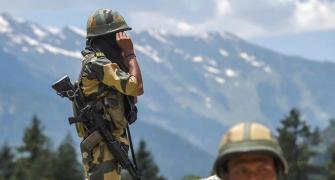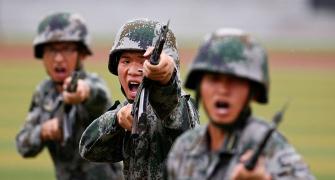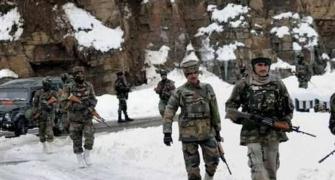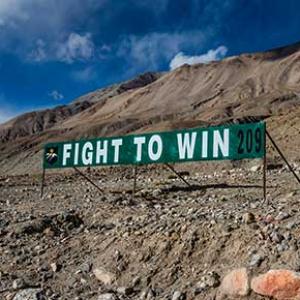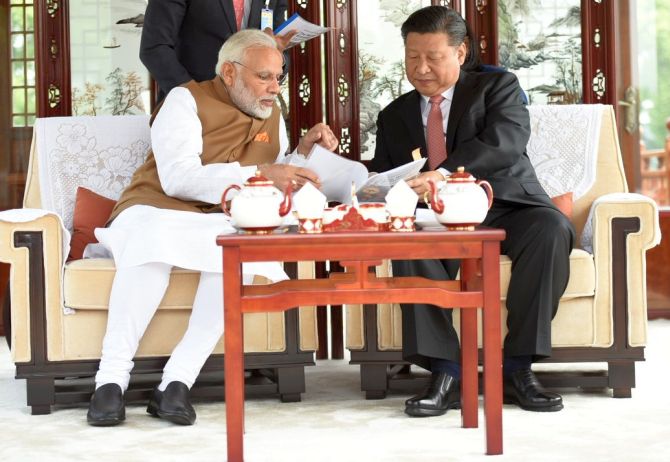'The BJP has done the Uri surgical strikes, handled the Dokalam crisis and the Balakot strikes.'
'So if there is a de-escalation only at the diplomatic level and not resolving this issue of a colonel being killed, then it translates into public anger.'
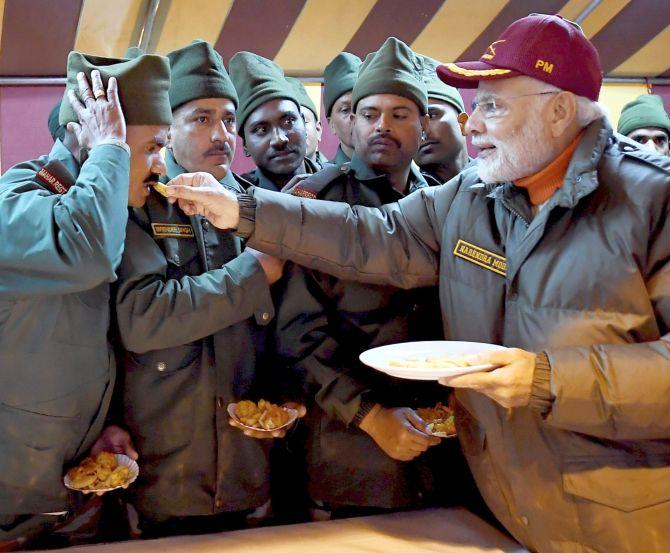
"When your senior level officer is killed, then there is the demand for a retaliatory move that prevails among the public. Specially for a nationalist government," Dr Srikanth Kondapalli, the well-known China scholar, tells Sheela Bhatt and Aniruddh Sheth in the concluding segment of the interview:
Is there a possibility of war?
One scenario is de-escalation, they go back home, both sides.
Second is local level tension, like the one we saw, but on a slightly higher scale, where you will have more beating-ups, casualties.
A third scenario is full mobilisation, but only in Ladakh.
If a fourth scenario is across the border -- the 3,488-km border -- or at the highest level, which is not thought of by both sides, not spoken about, but that is unlikely.
I want to say this because there is no set procedure between both the governments.
China has refused to discuss the nuclear domain with India.
While both have a no first-use policy, yet, there is no way to predict escalation when you are actively in war.
How is America viewing the Ladakh tension?
President Donald Trump mentioned that he wants to mediate. But there was no concrete offer, concrete proposal on this. And both sides have brushed it aside.
Secondly, this is the first time the US is speaking about the border in the western sector. They always spoke about the McMohan Line because they have close relations with Pakistan, a major non-NATO ally.
So they kept on keeping the Kashmir issue burning. But this time, they have not mentioned Kashmir but they mentioned this dispute.
One is, having a hyphenation between Beijing and New Delhi. That is what has happened in US foreign policy. Previously the hyphenation was between India and Pakistan.
If there is any role the US could play, possibly it can be to escalate the quadrilateral security dialogue or the deepening Indo-Pacific idea.
When the Dokalam incident happened, Prime Minister Modi visited the US and he secured about a hundred Predator Unmanned Aerial Vehicles.
So regardless of the American role in the Indo-Pacific or western centre, the arms transfer would continue.
Do you think China is trying to make the best of a very bad situation where India is preoccupied with COVID-19?
Is it a three-pronged attack, with China, Pakistan and Nepal getting aggressive against India?
Both sides are not willing to, but the fact of the matter is that this has happened.
India was surprised by the level of mobilisation.
About two months ago, China conducted a military exercise. So much of the equipment came from that exercise which they deployed in Aksai Chin, which is not far away from where the current events are happening./p>
And the Chinese foreign ministry's spokesperson commented that 'India is actually intruding'. That &'it is connecting the Daulat Beg Oldi-Shyok Durbug road connected to the LAC.'
Thereby, India will be in a more dominating position than compared to the Chinese military assets placed in this region.
So there is a fear that was expressed by the Chinese side, and this is a part of that preparation.
But nobody in China or India would have thought of this kind of escalation.
Although there were intelligence reports of general mobilisation, increasing the number of equipment by the Chinese side.
But, because of the informal summit meetings that they have had and the bonhomie that was expressed, and the level of cooperation that both sides...
So the killing of a colonel is the tipping point in this.
One can imagine, say, fist fights and others, because of the pent-up feelings at the local areas.
But stoning a commanding officer is a big offence.
In terms of a war situation what does the killing of a ranking officer mean?
This is a serious situation so we will have to actually wait for the Cabinet Committee on Security's public communique.
The statement from the army had mentioned de-escalation. Which means they are having a sober view in public.
If the other side has used barbaric methods there is a process. More matured militaries will involve in that kind of processes.
Because even during transgressions, when soldiers transgress on the other side, there is a procedure that if you are injured, if you need some help, they will give you hot water, medical aid, in the Confidence Building Measures.
Likewise on May 5, when we first had these incidents, one Chinese soldier slid from a hilltop to the bottom of the mountain and he was injured.
Indian soldiers helped in giving medicines and then handed him over to the Chinese side.
So there were also incidents of professionalism.
In terms of a diplomatic de-escalation, what is India likely to lose?
One is the impact on public opinion because the Bharatiya Janata Party is viewed as a nationalist party and it has done the Uri surgical strikes, handled the Dokalam crisis and the Balakot strikes.
So if there is a de-escalation only at the diplomatic level and not resolving this issue of a colonel being killed, then it translates into public anger, public dissatisfaction.
So the leadership also has to match up to the expectations of the public. So that is where the possibility of losing face lies.
The Indian government has kept silent on the whole episode since May. There was no statement.
Raksha Mantri Rajnath Singh mentioned that 'Achha khaasa se woh log aa gaye', translating to 'in quite sizeable numbers they intruded into Indian territory' is what he meant.
So he did acknowledge that they were sitting on our land.
Nitin Gadkari's statement that 'we don't, we are not looking for Chinese land, we have no ambition of acquiring Chinese land', that was a sobering note from a political perspective.
But that is not enough. When your senior level officer is killed, then there is the demand of retaliatory move that prevails among the public. Specially for a nationalist government.
We do not know how many people were killed during the Congress party's rule, but that was not known as a nationalist party as the BJP is. So the expectations were not high. But here the expectations are high.
So one of the things you will lose is backing of your own public opinion.

